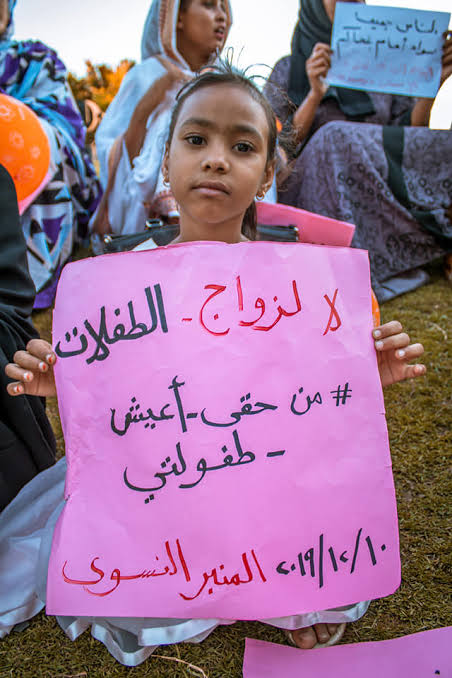
As the war in Sudan enters its 25th month, the phenomenon of child marriage has surged dramatically, especially in the states of South and West Kordofan. In many cases, families are marrying off their young daughters in an attempt to protect them from sexual violence associated with the armed conflict—only to see them become silent victims of a life they did not choose.
Child marriage is on the rise as a result of the war’s devastating consequences, often driven by social pressures or as a means of shielding girls from abduction in areas marked by ongoing violence and insecurity.
Forced into Marriage at 13
Nawal, who chose to share only her first name, is one such victim of early marriage. Living in Al-Qoz in South Kordofan, she spoke of her experience with sadness: “My father encouraged me to marry someone outside the family when I was just 13 years old. The wedding took place this past March, and I moved to a distant state. I fear the consequences in the future.”
She told Mashawir that her family convinced her it was the only solution under the difficult circumstances. Her father, who had lost his job in Khartoum, could no longer support her education. They believed marrying a man who could protect her was the best option, given the rising sexual violence tied to the war.
Nawal expressed hope to live safely with her husband and not be denied the opportunity to continue her education.
Multiple Drivers of Early Marriage
Psychologist Najlaa Abdel Mahmoud told Mashawir that child marriage is a crime from every humanitarian, legal, and social standpoint. She explained that the ongoing war has significantly increased early marriages, especially in cities experiencing active conflict and where families have been displaced from urban areas to IDP camps.
“In some rural communities, marrying off young girls is deeply rooted in cultural traditions,” she added. Families often turn to early marriage out of fear of rape, abduction, or enforced disappearance—or to obtain a dowry to help meet daily needs. “We cannot ignore the role of patriarchal culture, which exploits conflict conditions to control girls’ futures,” she emphasized.
Abdel Mahmoud noted that thousands of girls have been denied their rights to education and free choice in marriage. Many of these unions occur outside of court systems and are officiated only by religious clerics, leading frequently to divorce and a lack of legal protection.
International Concern
Save the Children has reported that armed fighters are committing sexual violence against teenage girls, including rape, in “alarming numbers.” The United Nations has also observed a “notable increase” in gender-based violence.
Save the Children’s Sudan Director Aref Noor said, “We know the official numbers only scratch the surface. Girls as young as 12 are being targeted based on their gender, ethnicity, or vulnerability.”
Reports have emerged of girls being detained for days and subjected to sexual assaults, including gang rapes.
UN agencies stated in a joint declaration that healthcare providers, social workers, counselors, and community protection networks have warned of a sharp rise in gender-based violence amid the ongoing hostilities across Sudan.
Broken Protection Mechanisms
Suleima Ishaq, head of the Unit for Combatting Violence Against Women and Children, said that current protection mechanisms are broken and offer little actual safety for girls during conflict. Families are resorting to early marriage either to avoid violations or to secure what they see as a more stable future amid national uncertainty—especially during displacement.
She expressed concern over rising abductions of young girls, particularly minors, in conflict zones. “All women in Sudan are at risk of sexual violence, as the war has expanded into several regions of the country,” she warned.
Distorted Ideas and Social Pressures
Sociologist Nada Al-Hadi noted that child marriage has spread in conflict-affected areas for several reasons, most commonly the belief that it protects girls from sexual violence, especially in the absence of effective protection systems.
She added that adolescent girls in Sudan are at high risk of sexual abuse, partly due to harmful myths—such as the belief that sex with a virgin girl enhances male virility or is safer due to the perceived lower risk of disease transmission.
The consequences of child marriage are severe: some girls attempt suicide due to the emotional toll of marital life at such a young age, while others suffer long-term physical and social complications.
Psychologically, early marriage can result in conditions such as hysteria, anxiety, depression, obsessive-compulsive disorder, or even schizophrenia—if not suicide or substance abuse.
Social Activists Raise Alarm
Community activist Buthaina Hammad, who works at displacement shelters in Al-Fula, West Kordofan, explained that multiple factors contribute to violence against women and girls in these camps, particularly child marriage.
She stated that family violence often manifests through forced marriages by guardians who believe this is the safest course of action. “The ongoing conflict has led families to marry off their daughters at a young age, based on their own desperate assessment of the harsh realities they face,” she added.
This report exposes the silent suffering of thousands of girls across Sudan—girls forced into adulthood and robbed of education, safety, and choice, as the war continues to erode the very fabric of their lives.




